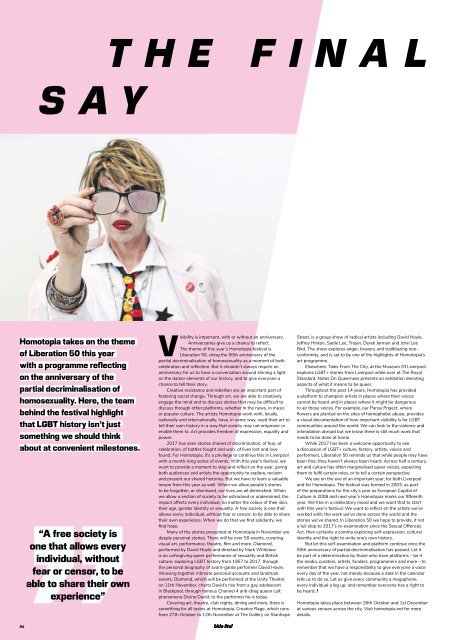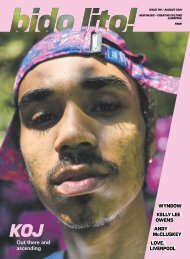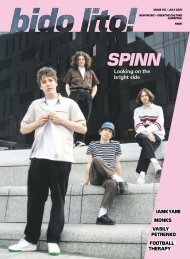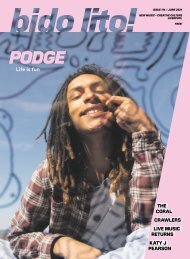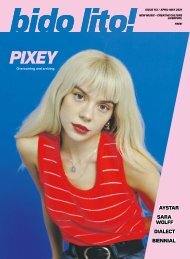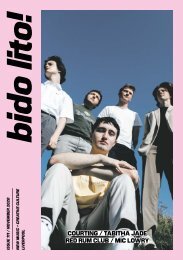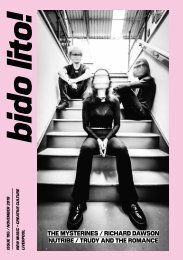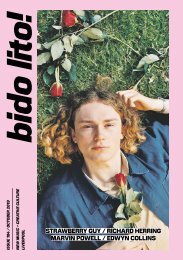Issue 83 / November 2017
November 2017 issue of Bido Lito! magazine. Featuring: SILENT BILL, SECRET SOCIETY OF SUPERVILLIAN ARTISTS, XAMVOLO, REMÉE, MERSEYRAIL SOUND STATION, HOWIE PAYNE, LOYLE CARNER, LIVERPOOL PSYCH FEST, ZOLA JESUS and much more.
November 2017 issue of Bido Lito! magazine. Featuring: SILENT BILL, SECRET SOCIETY OF SUPERVILLIAN ARTISTS, XAMVOLO, REMÉE, MERSEYRAIL SOUND STATION, HOWIE PAYNE, LOYLE CARNER, LIVERPOOL PSYCH FEST, ZOLA JESUS and much more.
Create successful ePaper yourself
Turn your PDF publications into a flip-book with our unique Google optimized e-Paper software.
SAY<br />
THE FINAL<br />
Homotopia takes on the theme<br />
of Liberation 50 this year<br />
with a programme reflecting<br />
on the anniversary of the<br />
partial decriminalisation of<br />
homosexuality. Here, the team<br />
behind the festival highlight<br />
that LGBT history isn’t just<br />
something we should think<br />
about at convenient milestones.<br />
“A free society is<br />
one that allows every<br />
individual, without<br />
fear or censor, to be<br />
able to share their own<br />
experience”<br />
Visibility is important, with or without an anniversary.<br />
Anniversaries give us a chance to reflect.<br />
The theme of this year’s Homotopia festival is<br />
Liberation 50, citing the 50th anniversary of the<br />
partial decriminalisation of homosexuality as a moment of both<br />
celebration and reflection. But it shouldn’t always require an<br />
anniversary for us to have a conversation around shining a light<br />
on the darker elements of our history, and to give everyone a<br />
chance to tell their story.<br />
Creative resistance and rebellion are an important part of<br />
fostering social change. Through art, we are able to creatively<br />
engage the mind and to discuss stories that may be difficult to<br />
discuss through other platforms, whether in the news, in music<br />
or popular culture. The artists Homotopia work with, locally,<br />
nationally and internationally, have, in some way, used their art to<br />
tell their own history in a way that society may not empower or<br />
enable them to. Art provides freedom of expression, equality and<br />
power.<br />
<strong>2017</strong> has seen stories shared of discrimination, of fear, of<br />
celebration, of battles fought and won, of lives lost and love<br />
found. For Homotopia, it’s a privilege to continue this in Liverpool<br />
with a month-long series of events. With this year’s festival, we<br />
want to provide a moment to stop and reflect on the year, giving<br />
both audiences and artists the opportunity to explore, reclaim<br />
and present our shared histories. But we have to learn a valuable<br />
lesson from this year as well. When we allow people’s stories<br />
to be forgotten, or dismissed, our lives are all diminished. When<br />
we allow a section of society to be ostracised or undermined, the<br />
impact affects every individual, no matter the colour of their skin,<br />
their age, gender identity or sexuality. A free society is one that<br />
allows every individual, without fear or censor, to be able to share<br />
their own experience. When we do that we find solidarity, we<br />
find hope.<br />
Many of the stories presented at Homotopia in <strong>November</strong> are<br />
deeply personal stories. There will be over 50 events, covering<br />
visual art, performance, theatre, film and more. Diamond,<br />
performed by David Hoyle and directed by Mark Whitelaw<br />
is an unforgiving queer performance of sexuality and British<br />
culture, exploring LGBT history from 1957 to <strong>2017</strong>, through<br />
the personal biography of avant-garde performer David Hoyle.<br />
Weaving together intimate personal accounts and landmark<br />
events, Diamond, which will be performed at the Unity Theatre<br />
on 11th <strong>November</strong>, charts David’s rise from a gay adolescent<br />
in Blackpool, through famous Channel 4 anti-drag queen cult<br />
phenomena Divine David, to the performer he is today.<br />
Covering art, theatre, club nights, dining and more, there is<br />
something for all tastes at Homotopia. Creative Rage, which runs<br />
from 27th October to 12th <strong>November</strong> at The Gallery on Stanhope<br />
Street, is a group show of radical artists including David Hoyle,<br />
Jeffrey Hinton, Sadie Lee, Trojan, Derek Jarman and John Lee<br />
Bird. The show explores anger, bravery and trailblazing nonconformity,<br />
and is set to be one of the highlights of Homotopia’s<br />
art programme.<br />
Elsewhere, Tales From The City, at the Museum Of Liverpool,<br />
explores LGBT+ stories from Liverpool while over at The Royal<br />
Standard, Notes On Queerness presents an exhibition denoting<br />
aspects of what it means to be queer.<br />
Throughout the past 14 years, Homotopia has provided<br />
a platform to champion artists in places where their voices<br />
cannot be heard and in places where it might be dangerous<br />
to air those voices. For example, our Pansy Project, where<br />
flowers are planted on the sites of homophobic abuse, provides<br />
a visual documentation of how important visibility is for LGBT<br />
communities around the world. We can look to the violence and<br />
intimidation abroad but we know there is still much work that<br />
needs to be done at home.<br />
While <strong>2017</strong> has been a welcome opportunity to see<br />
a discussion of LGBT+ culture, history, artists, voices and<br />
performers, Liberation 50 reminds us that while people may have<br />
been free, they haven’t always been heard. Across half a century,<br />
art and culture has often marginalised queer voices, expecting<br />
them to fulfil certain roles, or to tell a certain perspective.<br />
We are on the eve of an important year, for both Liverpool<br />
and for Homotopia. The festival was formed in 2003, as part<br />
of the preparations for the city’s year as European Capital of<br />
Culture in 2008 and next year’s Homotopia marks our fifteenth<br />
year. We’ll be in a celebratory mood and we want that to start<br />
with this year’s festival. We want to reflect on the artists we’ve<br />
worked with, the work we’ve done across the world and the<br />
stories we’ve shared. In Liberation 50 we hope to provide, if not<br />
a full stop to <strong>2017</strong>’s re-examination since the Sexual Offences<br />
Act, then certainly a comma exploring self-expression, cultural<br />
identity and the right to write one’s own history.<br />
But let this self-examination and platform continue once the<br />
50th anniversary of partial decriminalisation has passed. Let it<br />
be part of a determination by those who have platforms – be it<br />
the media, curators, artists, funders, programmers and more – to<br />
remember that we have a responsibility to give everyone a voice<br />
every day of the year, not merely because a date in the calendar<br />
tells us to do so. Let us give every community a megaphone,<br />
every individual a leg up, and remember everyone has a right to<br />
be heard. !<br />
Homotopia takes place between 26th October and 1st December<br />
at various venues across the city. Visit homotopia.net for more<br />
details.<br />
54


